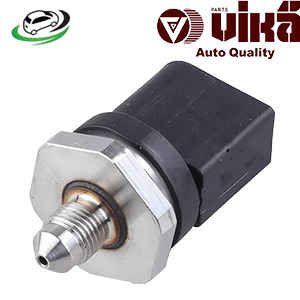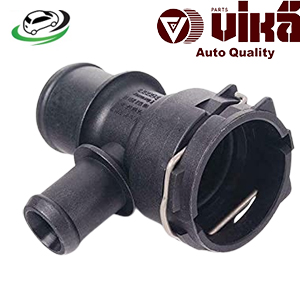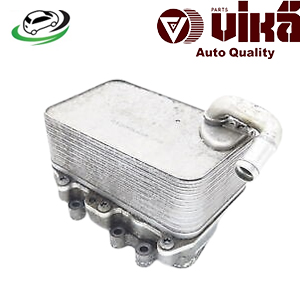-9%
Get AUDI A4 B8 (8K2)/ A5 (8T3)/ A6 C7 (4G2 4GC)/ Q5 (8RB)/ Q5 Van (8RB) / VW Touareg (7P5 7P6) Engine Oil Cooler 059117021R
The engine oil cooler is a vital component of a vehicle’s lubrication system, designed to regulate the temperature of engine oil and enhance overall engine performance and longevity. By preventing overheating and maintaining optimal oil temperature, this component plays a significant role in ensuring efficient lubrication, reducing wear on engine components, and promoting reliable operation. Understanding the functions, benefits, common symptoms of failure, and maintenance practices related to the engine oil cooler is essential for vehicle owners and automotive professionals.
Functions of the Engine Oil Cooler
- Temperature Regulation: The primary function of the engine oil cooler is to maintain the oil temperature within an optimal range. Engine oil can become excessively hot during operation, especially under heavy load or high-performance conditions. The oil cooler helps dissipate heat from the oil, ensuring that it remains within the recommended temperature range for effective lubrication.
- Heat Exchange: The engine oil cooler works on the principle of heat exchange, typically using coolant from the vehicle’s cooling system to absorb heat from the oil. As the oil flows through the cooler, heat is transferred to the coolant, which then dissipates it through the radiator. This process prevents the oil from overheating, which could lead to breakdown and loss of lubrication properties.
- Improved Lubrication: Maintaining an optimal oil temperature is crucial for effective lubrication. When oil becomes too hot, its viscosity decreases, leading to reduced lubrication effectiveness and increased wear on engine components. The engine oil cooler helps ensure that the oil retains its viscosity and lubricating properties, thereby protecting engine parts from excessive friction and wear.
- Enhanced Engine Performance: By regulating oil temperature, the engine oil cooler contributes to improved engine performance. Properly cooled oil helps maintain consistent engine operation, reducing the risk of overheating and ensuring efficient combustion. This can result in better acceleration, improved fuel efficiency, and overall enhanced driving experience.
- Extended Engine Life: By preventing oil overheating and maintaining proper lubrication, the engine oil cooler helps extend the life of the engine. Cooler oil reduces thermal stress on engine components, which can lead to premature wear and failure. This is especially important for high-performance or heavy-duty applications where engine stress is greater.
Design and Construction of the Engine Oil Cooler
The design and construction of engine oil coolers can vary significantly depending on the vehicle’s make and model, as well as the intended application. However, some common features include:
- Core Design: Engine oil coolers typically feature a core made of aluminum or copper, which provides excellent heat transfer properties. The core consists of a series of tubes or plates through which oil flows, allowing heat to dissipate to the coolant surrounding it.
- Fins: Many oil coolers are equipped with fins that increase the surface area for heat exchange. These fins enhance the cooling efficiency by allowing more coolant to come into contact with the cooler surface, improving heat dissipation.
- Mounting Points: Engine oil coolers are designed with specific mounting points to ensure secure installation in the engine bay. They are usually located near the engine or integrated with the vehicle’s radiator system for optimal airflow and cooling efficiency.
- Inlet and Outlet Ports: Oil coolers have designated inlet and outlet ports for connecting to the engine oil system and coolant system. Properly routing the oil and coolant lines is essential for effective operation and ensures that the oil passes through the cooler before returning to the engine.
Benefits of a Properly Functioning Engine Oil Cooler
A well-functioning engine oil cooler provides numerous benefits that enhance overall vehicle performance and longevity:
- Improved Engine Efficiency: By maintaining optimal oil temperature, the engine oil cooler contributes to improved engine efficiency. Cooler oil enhances lubrication, reducing friction and enabling the engine to operate smoothly and efficiently.
- Increased Fuel Efficiency: An engine running at the right temperature consumes fuel more efficiently. By keeping the oil cooler, the engine operates more effectively, which can lead to improved fuel economy over time.
- Enhanced Performance in Extreme Conditions: High-performance engines or vehicles subjected to extreme operating conditions (e.g., towing, off-roading) benefit significantly from an engine oil cooler. It helps prevent overheating, ensuring reliable operation even under demanding circumstances.
- Longer Oil Life: Overheating can lead to the breakdown of oil, causing it to lose its lubricating properties and effectiveness. By regulating temperature, the engine oil cooler helps prolong oil life, reducing the frequency of oil changes and associated costs.
- Reduced Risk of Engine Damage: An overheated engine can lead to severe damage, including warped components, oil breakdown, and even catastrophic engine failure. The engine oil cooler mitigates this risk by maintaining proper oil temperature, protecting critical engine parts from thermal stress.
Symptoms of a Failing Engine Oil Cooler
Recognizing the symptoms of a failing engine oil cooler is crucial for maintaining vehicle performance and preventing engine damage:
- Overheating Engine: One of the most apparent signs of a failing oil cooler is engine overheating. If the oil cooler is not effectively dissipating heat, the engine may run hotter than normal, leading to potential damage and reduced performance.
- Low Oil Pressure: A malfunctioning oil cooler can result in low oil pressure, which may trigger warning lights on the dashboard. Low pressure can lead to inadequate lubrication, increasing the risk of engine wear and damage.
- Oil Contamination: If the engine oil cooler fails, coolant may leak into the oil system, causing oil contamination. This can lead to milky or frothy oil, which is a sign of coolant mixing with oil and should be addressed immediately.
- Fluid Leaks: Visible leaks around the oil cooler or associated lines can indicate a problem. Leaks can lead to a drop in oil levels and pressure, compromising lubrication and leading to potential engine damage.
- Increased Exhaust Smoke: If the oil cooler fails, it may lead to increased exhaust smoke, particularly if coolant enters the combustion chamber. This can signify serious issues that require immediate attention.
Maintenance of the Engine Oil Cooler
Proper maintenance of the engine oil cooler is essential for ensuring its reliable operation and longevity:
- Regular Inspections: Incorporate the oil cooler into routine maintenance inspections. Look for signs of leaks, damage, or corrosion. Regular visual checks can help identify potential issues before they escalate.
- Coolant System Maintenance: Since the engine oil cooler relies on coolant for effective heat exchange, maintaining the coolant system is crucial. Regularly check coolant levels, and replace coolant according to the manufacturer’s recommendations to ensure optimal performance.
- Oil Changes: Adhere to a regular oil change schedule using high-quality oil that meets the manufacturer’s specifications. Fresh oil is better equipped to handle heat and maintain optimal lubrication.
- Address Leaks Promptly: If any leaks are detected, address them immediately. Fluid leaks can lead to low oil levels, which can compromise engine lubrication and performance.
- Professional Servicing: If experiencing symptoms of a failing oil cooler or any related issues, consider having the vehicle diagnosed by a professional mechanic. They can accurately assess the condition of the oil cooler and associated systems, ensuring proper repair or replacement.
Conclusion
In conclusion, the engine oil cooler is a critical component of a vehicle’s lubrication system, responsible for regulating oil temperature and ensuring optimal engine performance, efficiency, and longevity. Its functions include heat exchange, improved lubrication, and enhanced engine performance. A properly functioning engine oil cooler offers numerous benefits, including improved fuel efficiency, reduced risk of engine damage, and extended oil life. Regular maintenance and prompt attention to symptoms of failure are essential for keeping the engine oil cooler in optimal condition. By understanding the importance of the engine oil cooler, vehicle owners can take proactive measures to maintain their vehicles, ensuring a smooth, efficient, and reliable driving experience.
Follow us on Facebook for more parts.




Reviews
Clear filtersThere are no reviews yet.